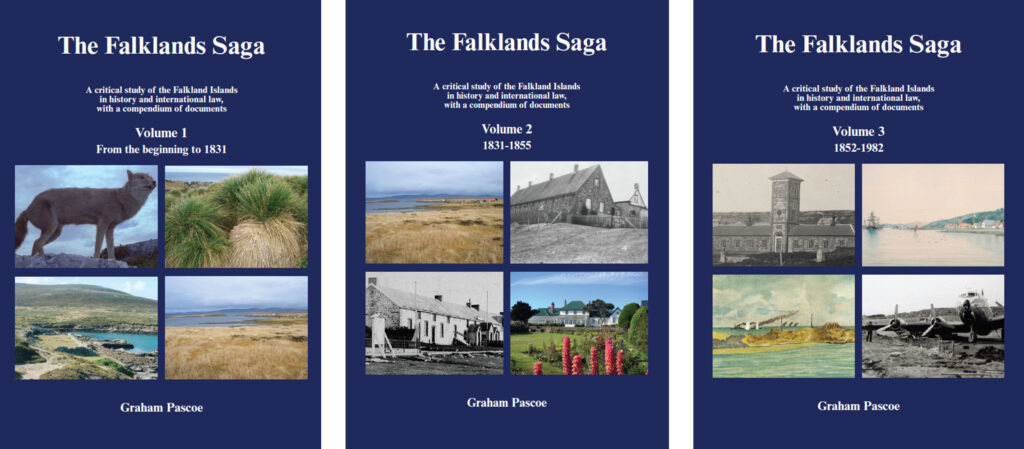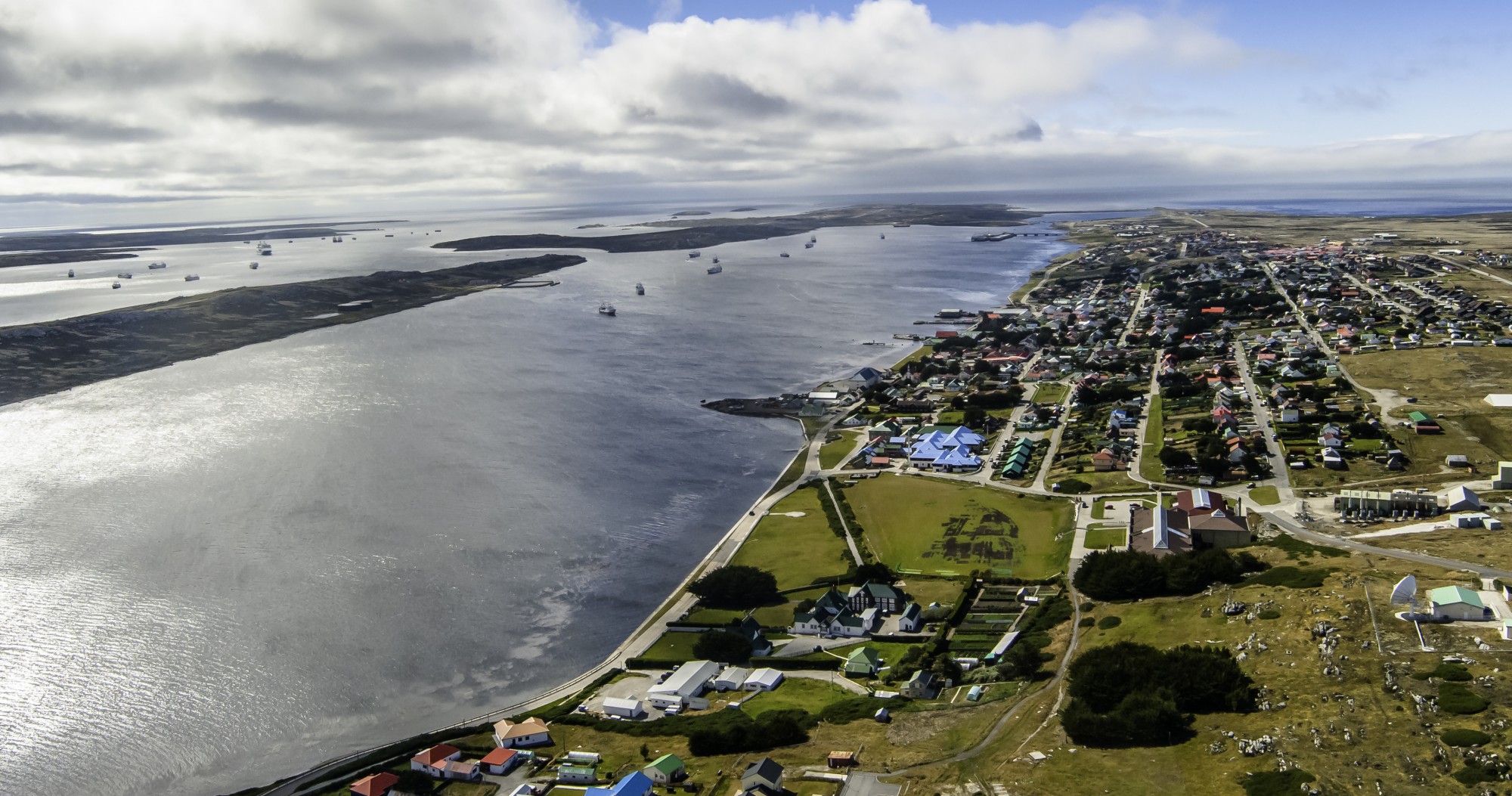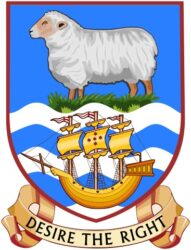The Falklands Saga is a groundbreaking study, the result of over 20 years of research in archives and libraries in Buenos Aires, La Plata, Montevideo, London, Cambridge, Stanley, Paris, Munich and Washington DC. It is intended as a fundamental resource for all researchers into the history and legal status of the Falkland Islands.
Each volume will appear in a hardcover Library Edition, a Standard Edition (print-on-demand) and e-book.

Volume 1 briefly describes the Falklands landscape and wildlife before analysing the discovery of the islands, revealing strong evidence that they were discovered at the latest around 1518-19 by a Portuguese expedition, not by Vespucci or Magellan.
It recounts early visits to the islands, and gives a detailed description of the First Falklands Crisis of 1764-71, in which France set up the first settlement in the islands, followed by Britain. The Spanish government then forced France to hand the islands over to Spain; war threatened between Britain and Spain over the Falklands but was averted by the Anglo-Spanish agreement of 1771. An examination of the original texts demonstrates that the agreement did not contain a reservation of Spanish rights, that Britain did not make a secret promise to abandon the islands, and that the Nootka Sound Convention of 1790 did not restrict Britain’s rights but greatly extended them at the expense of Spain.
The French, British and Spanish periods in the 18th century are recounted, and the Argentine period (1824-33) is described in greater detail than in any previous work, with extensive documentation from the Argentine national archives in Buenos Aires and the National Archives in London. The development of the islands’ population is analysed, revealing how tiny the Argentine settlement was in 1826-33. In April 1829 there were only 52 people, and there was a constant turnover; many people stayed only a few months. The maximum number of people during the Argentine period was 128 in July 1831.
Volume 1 ends just before the beginning of the Second Falklands Crisis of 1831-3, unleashed by Argentina’s representative in the islands, Louis Vernet, who seized three American sealing ships. The resulting international crisis is recounted in volume 2.
Volume 2 takes the story from 1831 to 1855. It describes the Second Falklands Crisis of 1831-3, beginning with a dispute between Argentina and the United States unleashed by Louis Vernet, Argentina’s representative in the islands. He seized three American sealing ships; the United States reacted by removing over half the population (about 47 out of 85 people, leaving about 38). British concerns over possible US involvement led Britain to re-assert sovereignty over the islands in 1833, and to exercise it from 1834.
The myth that Britain expelled an Argentine population from the Falklands in 1833 is refuted in detail from the original documents – in fact Britain expelled only the mutinous, murderous Argentine garrison, but encouraged the civilian residents to stay, and most did.
There followed the “Year of Limbo” in 1833-4, without an official presence from any country. The events of 1833-4, during which Charles Darwin visited the Falklands twice, are recounted, and the Port Louis murders of 26 August 1833 are described in detail.
A crucial document printed here is the 1850 Convention of Peace between Argentina and Britain. At Argentina’s insistence, this was a comprehensive peace treaty which restored “perfect friendship” between the two countries. Critical exchanges between the Argentine and British negotiators are printed for the first time, which show that Argentina dropped its claim to the Falklands and accepted that the islands are British. That, and many later acts by Argentina, definitively ended any Argentine title to the islands.
Volume 2 ends in 1855, by which time the first generation of native Falkland Islanders was beginning to be born.
Volume 3 takes the story from 1852 to 1982. Argentina gave up its claim to the Falklands
by the Convention of Peace in 1850 (Volume 2), and did not protest against Britain’s
possession of the islands for 38 years. Nevertheless, Argentina made an abortive attempt
to raise a claim to the islands in 1885-8 (described in detail), but abandoned it again.
Three wars are described from a Falklands perspective: the First World War, including the
Battle of the Falklands in 1914; the Second World War, including the Battle of the River
Plate in 1939, and the run-up to the Third Falklands Crisis, the Falklands War of 1982,
most of which is recounted in Volume 4.
Two of the three evacuations of children from Stanley to other parts of the islands in the
face of imminent danger are recounted in this volume: those in 1914 and 1942; the third
evacuation of children, in 1982, is described in Volume 4.
This volume describes the stagnation of the islands’ economy in the 1950s and 60s, and
the intensifying Argentine campaign to take the islands over, including the first three
“amateur Argentine invasions”. Argentina’s campaign at the UN to force Britain to hand
the islands over is described in detail, and its many historical errors are refuted.
The legal status of the Falklands is further illuminated by comparison with other territorial
disputes including those over Heligoland (1890), the Chagos Islands (from 1965) and the
Western Sahara (1975); the cases of Kuwait and Kosovo are discussed in Volume 4.
Volume 3 concludes with the landing of the first Argentine invaders on the night of 1-2
April 1982, and the start of the “invasion phone-in”, as islanders phoned the Stanley radio
studio and described the invasion of their country as it took place around them. The
phone-in is transcribed in full in Volumes 3 and 4.
To purchase, please click here.
In preparation:
Volume 4: 1982 to the present: The Third Falklands Crisis: the Falklands War, 1982: Invasion; Occupation; Liberation; The Present and the Future; International Law: Legal Status of the Falklands
Volume 5: Index to Volumes 1-4

